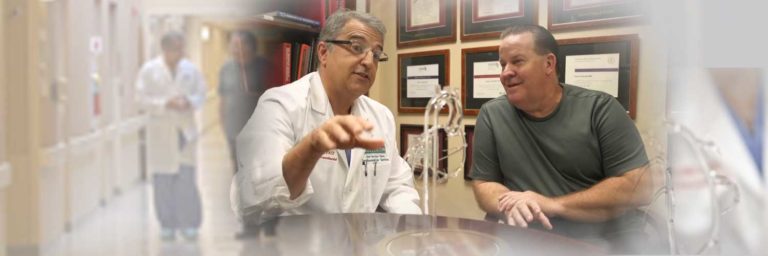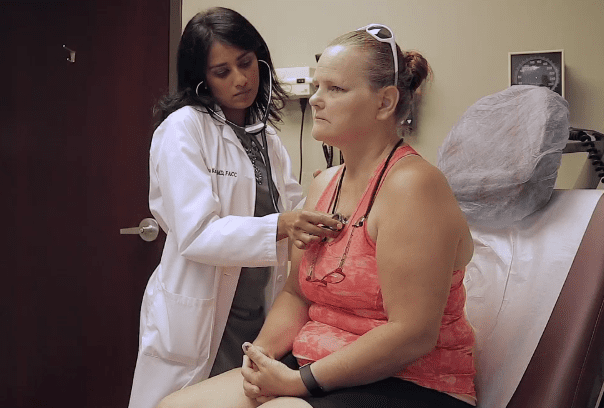Over 600,000 people die of heart disease in the United States every year, accounting for about one in every four deaths. That makes heart disease – sometimes known as cardiovascular disease (CVD) – the leading cause of death for both men and women in the US.

While most people understand that a healthy lifestyle consisting of regular exercise and a nutritious diet is one’s best defense against developing a serious heart condition, recognizing the symptoms associated with heart disease can be a difficult task, especially for someone who has never had a personal history of heart problems before.
Here are some signs to look for when it comes to heart-related ailments that should have you seeking an appointment with a cardiologist specialist as soon as possible:
1. High blood pressure
The associated risk for those who have a history of high blood pressure (HBP or hypertension) is essentially the same as it is for people who have diabetes. HBP leads to the slow process called atherosclerosis: that’s when the coronary arteries become narrower via fat buildup, cholesterol, and/or other substances called plaque. A blocked artery prevents the flow of blood through the heart muscle and can result in a heart attack.
2. Chest pains
While chest pain sends millions of Americans into hospital emergency rooms each year, only 20 percent of them end up having experienced a heart attack or an episode of angina (a type of chest pain caused by reduced blood flow to the heart). A “regular” angina occurs when there isn’t enough oxygen-rich blood reaching part of the heart during times of physical activity. That said, there can also be very serious reasons behind chest pain. For instance, an aortic dissection (a tear in the inner layer of the aorta) or a pulmonary embolism (a blood clot in the lungs). If you experience any extended amount of pain in the area around your heart, seek medical attention as soon as you can!
Diabetes
3. Diabetes is the condition in which the body does not properly process food for use as energy. High blood sugar levels are the main cause for concern here. High glucose in the blood stream is detrimental to the arteries over time, causing fatty material to build up and block blood flow to the heart or brain. This is why it is essential to see a cardiologist to assess your situation. Fore more information about Diabetes, please click here.
4. Shortness of breath, palpitations or dizziness
Palpitations – that feeling when your heart speeds up unexpectedly, causing a pounding, racing feeling – can happen as a result of a heart rhythm disturbance. Atrial fibrillation is a heart rhythm problem that causes a racing irregular heart rate. A more serious disturbance, such as ventricular tachycardia, can lead to dizzy spells or blackouts.
5. Smoking
By now, most people are very aware of the respiratory problems and lung cancer risks that come with smoking tobacco regularly. However, smoking can take a terrible toll on your heart health as well. Compared to nonsmokers, those who regularly smoke have about a 70 percent higher death rate from coronary artery disease. Not only does smoking raise blood pressure, it tightens the arteries and blocks blood flow to the heart. This speeds up the heart, making it work extra hard.
6. Waist circumference
For people who tend to carry the majority of their fat around their waist (opposed to their hips), the risk of developing coronary heart disease is very elevated. Experts widely agree that waist circumference (WC) is a better predictor of cardiovascular disease risk than someone’s body mass index (BMI), especially for women. Abdominal obesity classifications can vary from person to person, so be sure to consult with your heart doctor on what your ideal belly size should be and what you can do to prevent it from having a devastating effect on your health and lifespan.
7. Inactive / sedentary lifestyle
While family history or personal early-age heart disease may deal some of us a bad hand, our commitment to exercise and staying physically active can put us in control of our own fortune. Exercise strengthens the muscles in the heart, making blood flow more efficiently all throughout the body. Not only does it help cut back on that ever-troubling abdominal fat, but it reduces high blood pressure as well. However, always meet with your cardiologist specialist before beginning any new workout routine, especially if you have been inactive for an extended period of time. Then go ahead and get moving!
Cardiovascular Consultants
Cardiovascular Consultants is a dedicated group of physicians who have devised a multi-disciplinary approach for prevention and treatment of cardiac and vascular disease. With emphasis on:
(Primary prevention)
1. Reduce to a minimum the likelihood of threatening cardiovascular adverse events.
(Secondary prevention)
2. To minimize the potential of recurring cardiovascular complications.
Cardiovascular Consultants are in Rochester Hills, Sterling Heights and Washington Township, Michigan. Please give us a call 586-698-1200 to schedule an appointment with the closest location to you.




